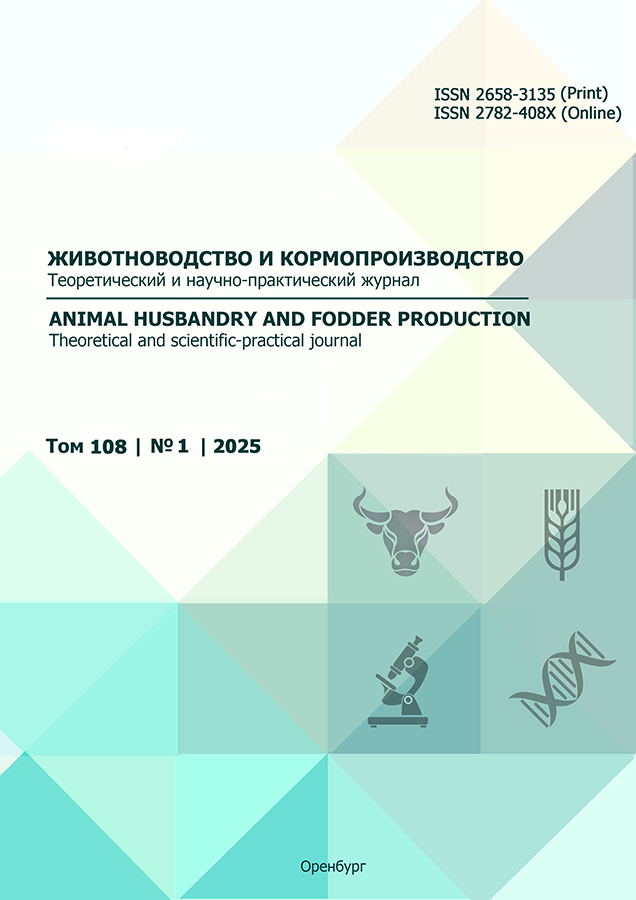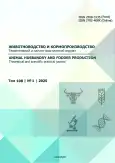The influence of weather conditions and cellulolytic activity of soil on the yield of durum wheat in the steppe zone of the Southern Urals
- Authors: Skorokhodov V.Y.1, Mitrofanov D.V.1
-
Affiliations:
- Federal Research Centre of Biological Systems and Agrotechnologies of the Russian Academy of Sciences
- Issue: Vol 108, No 1 (2025)
- Pages: 187-200
- Section: Geoponics and crop production
- URL: https://journal-vniispk.ru/2658-3135/article/view/290026
- DOI: https://doi.org/10.33284/2658-3135-108-1-187
- ID: 290026
Cite item
Full Text
Abstract
The work is devoted to the problems of assessing the dependence of durum wheat productivity on a number of factors in unstable climatic conditions. In the presented work, the influence of air temperature, precipitation, dry wind days, cellulolytic activity and nitrate nitrogen content in the soil on the productivity of durum wheat in the system of six-field, two-field crop rotations and monoculture in the arid conditions of the Southern Urals was studied for the first time. Field experiments were carried out on a long-term experimental plot for crop rotations and monocultures. Durum wheat crops were placed in crop rotations and monoculture near the village of Nezhinka, Orenburg region (coordinates: 51.775125o N and 55.306547o E). Research (2002-2022) established average values of air temperature - 5.7-22.7 °C, precipitation - 22-364 mm, number of dry wind days - 68, cellulolytic activity of the soil - 0.69-0.76%, nitrate nitrogen content - 0.32-0.75 mg/100 g of soil, crop yield - 0.48-0.97 t/ha. A correlation was found between grain yield and air temperature in May, June (r = 0.49-0.65) and during the growing season (r = 0.40-0.47), with precipitation in May, June (r = 0.33-0.67) and during May-August (r = 0.44-0.60), with the number of dry wind days (r = 0.30-0.41), with the hydrothermal coefficient in May, June (r = 0.41-0.76) and during the growing season (r = 0.50-0.66). The lowest relationship between weather factors and yield was noted in July and August. A weak relationship was found between cellulolytic activity of the soil and yield (r = 0.17-0.31). A weak dependence of grain yield on the nitrate nitrogen content in the soil after sowing the crop (r = 0.13-0.34) and the difference (N-NO3) during the growing season (r = 0.01-0.17) was noted. In the arid conditions of the Southern Urals, a slowdown in the vital activity of microflora is noted due to a lack of soil moisture, which contributes to a decrease in the relationship between cellulolytic activity and the yield of spring durum wheat. Thus, weather conditions are fundamental in the formation of the yield of spring durum wheat.
About the authors
Vitaly Yu. Skorokhodov
Federal Research Centre of Biological Systems and Agrotechnologies of the Russian Academy of Sciences
Author for correspondence.
Email: skorohodov.vitali1975@mail.ru
ORCID iD: 0000-0003-4179-7784
Cand. Sci. (Agriculture), Leading Researcher, Department of Agriculture and Resource-Saving Technologies
Russian Federation, OrenburgDmitry V. Mitrofanov
Federal Research Centre of Biological Systems and Agrotechnologies of the Russian Academy of Sciences
Email: dvm.80@mail.ru
ORCID iD: 0000-0002-7172-6904
Cand. Sci. (Agriculture), Leading Researcher, Department of Agriculture and Resource-Saving Technologies
Russian Federation, OrenburgReferences
- Besaliev IN, Mironenko SI. Yield and grain quality of spring durum wheat in the conditions of the Orenburg Cis-Urals. Animal Husbandry and Fodder Production. 2024;107(4):324-336. doi: 10.33284/2658-3135-107-4-324
- Vasin VG, Burunov AN, Strizhakov AO. Agrophytocenosis formation and productivity of spring durum wheat in case of application of mineral fertilizers. Vestnik of Ulyanovsk State Agricultural Academy. 2021;1(53):25-32. doi: 10.18286/1816-4501-2021-1-25-32
- Denisov KE, Poletaev IS, Geraskina AA, Tonkoshkur VA, Kondakov KS, Solovieva EB. The influence of mineral and microbiological fertilizers on the biological activity of chestnut soil and the productivity of spring durum wheat in the conditions of the dry steppe of the Volga region. Agrarian Scientific Journal. 2022;12:27-30. doi: 10.28983/asj.y2022i12pp27-30
- Skorokhodov VYu, Kaftan YuV, Zorov AA, Skorokhodova EN, Zenkova NA. Quality of spring soft and durum wheat grain in crop rotations of the Orenburg Cis-Urals. Animal Husbandry and Fodder Production. 2023;106(4):260-272. doi: 10.33284/2658-3135-106-4-260
- Kruglov YuV, Kurdyukov YuF, Shubitidze GV. Microbiological activity of southern chernozem dependent on agrotechnic measures in the dry steppe zone of the lower Volga region. The Agrarian Scientific Journal. 2018;1:20-23.
- Kuznetsov DA. Influence of mineral fertilizers and seeding rates on the yield and quality of spring wheat grain. The Agrarian Scientific Journal. 2020;11:25-29. doi: 10.28983/asj.y2020i11pp25-29
- Markova IN. Spring durum wheat in the Volgograd region: varieties, yield, prospects of cultivation. Scientific Agronomy Journal. 2024;2(125):58-63. doi: 10.34736/FNC.2024.125.2.008.58-63
- Obshhiya EN, Khripunov AI. Cellulose-decomposing soil activity in the conditions of the landscape slope lands as one of the elements of its biological activity. Agricultural Journal. 2019;2(12):25-28. doi: 10.25930/004.2.12.2019
- Podsevalov MI, Toigildin AL, Ayupov DE. Influence of agro techniques on biological soil activity and winter wheat yield in crop rotation in the forest-steppe of Zavolzhie region. Vestnik of Ulyanovsk State Agricultural Academy. 2017;1(37):44-50. doi: 10.18286/1816-4501-2017-1-44-50
- Shoba VN, Kalichkin VK, Kim SA, Kalichkin AV. Rezerves to increase yield of spring wheat in the forest-steppe of Western Siberia. Achievements of Science and Technology in Agro-Industrial Complex. 2017;31(6):31-33.
- Saidyasheva GV, Zaitseva KG. Effect of mineral and biomineral fertilizers and BisolbiFit biological preparation on the biological activity of soil and spring wheat yield. Vestnik of Voronezh State Agrarian University. 2022;1(72):101-107. doi: 10.53914/issn2071-2243_2022_1_101-107
- Sannikova N. Segetal flora in the crops of spring wheat in the forest-steppe zone of the Northern Trans-Urals. Bulletin of Michurinsk State Agrarian University. 2021;2(65):37-40.
- Sapega VA, TursumbekovaGSh. Yield, ecological plasticity and stability of spring soft and durum wheat varieties in the southern forest steppe of Tyumen region. Agricultural Science Euro-North-East. 2020;21(2):114-123. doi: 10.30766/2072-9081.2020.21.2.114-123
- Skorokhodov VYu. Improvement of cultivation technology of spring did wheat in the steppe zone of the South-Ern Urals. The Agrarian Scientific Journal. 2021;7:49-53. doi: 10.28983/asj.y2021i7pp49-53
- Skorokhodov VYu. Yield of spring durum wheat against the background of cellulolytic activity of the soil. The Agrarian Scientific Journal. 2023;12:75-80. doi: 10.28983/asj.y2023i12pp75-80
- Skorokhodov VYu, Zorov AA. Features of the influence of the steam field on the formation of agrocenosis and the productivity of spring wheat in the field crop rotations of the region with unstable humidity. Russian Agricultural Sciences. 2021;5:3-8. doi: 10.31857/S250026272105001X
- Tyutyuma NV, Zvereva GN, Kuznetsova EA. Mineral nutrition is the key to the yield of durum wheat in the South of Russia. Natural Sciences. 2024;3(16):49-56. doi: 10.54398/2500-2805.2024.16.3.005
- Ayadi S, Jallouli S, Landi S, Capasso G, Chamekh Z, Cardi M, Paradisone V, Lentini M, Karmous C, Trifa Y, Esposito S. Nitrogen assimilation under different nitrate nutrition in Tunisian durum wheat landraces and improved genotypes. Plant Biosystems. 2020;154(6):924-934. doi: 10.1080/11263504.2020.1722274
- Kenobi K, Atkinson JA, Wells DM, Gaju O, De Silva JG, Foulkes MJ, Dryden IL, Wood AT, Bennett MJ. Linear discriminant analysis reveals differences in root architecture in wheat seedlings related to nitrogen. Journal of Experimental Botany. 2017;68(17):4969-4981. doi: 10.1093/jxb/erx300
- Patanita M, Tomaz A, Ramos T, Oliveira P, Boteta L, Dôres J. Water regime and nitrogen management to cope with wheat yield variability under the mediterranean conditions of Southern Portugal. Plants. 2019;8(10):429. doi: 10.3390/plants8100429
- Phuke RM, Ambati D, Singh JB, Prakasha TL, Sai Prasad SV. Prospects of durum wheat in the realm of climate change. In: Kashyap PL, et al. New horizons in wheat and barley research. Singapore: Springer; 2022:485-506. doi: 10.1007/978-981-16-4449-8_19
Supplementary files











